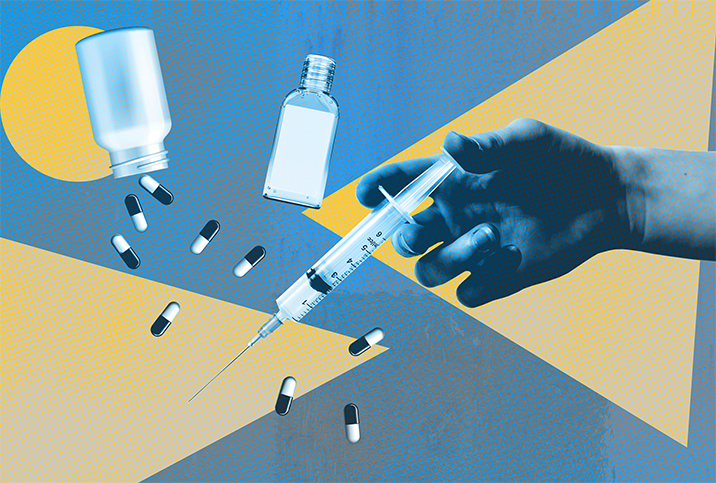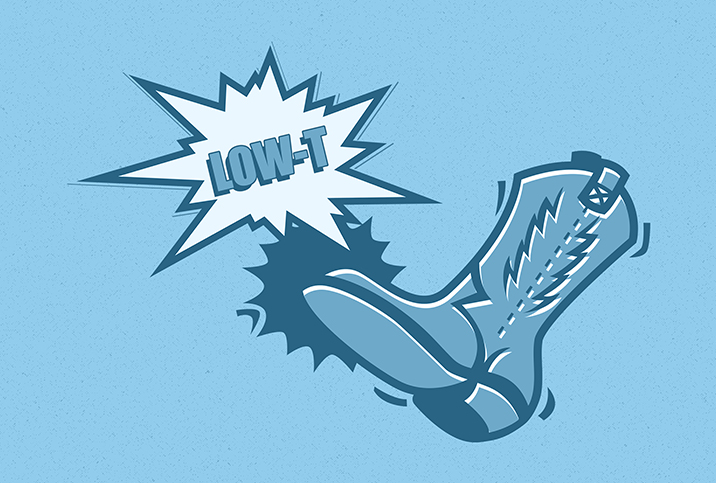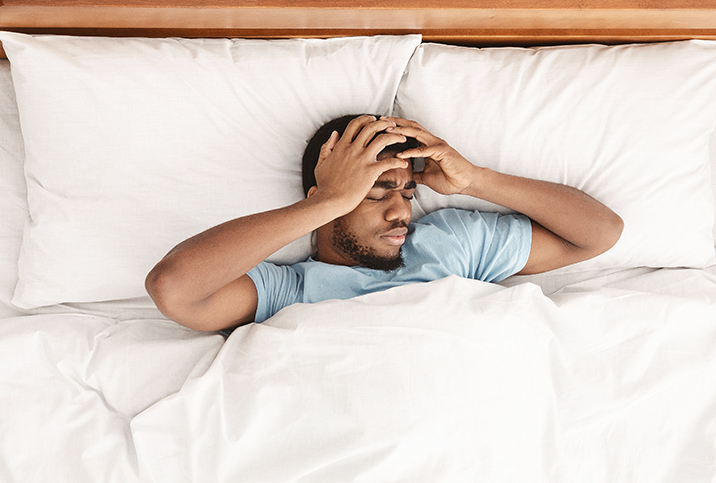Problems Caused by Low-T—Including 7 That May Surprise You

Low testosterone (low-T) can be responsible for a lot of symptoms. Some you likely know about, but there are several symptoms you might not connect with low-T.
A fairly common condition, low-T affects from 10 percent to 40 percent of men globally.
"Low testosterone levels are becoming more common as men age, and it's estimated that millions of men in the U.S. alone are affected by this condition," said Justin Houman, M.D., a reproductive urologist and men's health specialist at Tower Urology in Los Angeles and the medical director for Bastion Health, an app-based telehealth platform for men.
Low-T can have serious effects on health, but the symptoms can be subtle, Houman explained.
"Symptoms of low testosterone can develop gradually, making it easy to overlook or attribute to other causes," he said.
That is why you should understand not just the typical symptoms but also the lesser-known ones, so you can have insight into what causes low-T and what effect it may have on your health.
Causes of low-T
Lower levels of testosterone can be seen with increasing age, according to Asima Ahmad, M.D., M.P.H., a reproductive endocrinologist and infertility specialist, and the co-founder and chief medical officer of Carrot Fertility, a global fertility care organization.
"After the age of 40, testosterone decreases in the male by approximately 1 percent per year," Ahmad said.
However, aging isn't the only cause of low-T, Houman said. A variety of factors can affect testosterone levels, including the following:
- Obesity
- Inherited disorders, such as Klinefelter syndrome
- Infections, such as mumps orchitis
- Testicular injury
- Chemotherapy or radiation treatment
- Medications, such as opioids and glucocorticoids
- Chronic illnesses, such as diabetes, liver or kidney disease, and hormonal imbalances
"It's really important for men to be aware that testosterone gets lower as we get older," said Michael Werner, M.D., the medical director and founder of Maze Men's Sexual & Reproductive Health, based in New York City and Purchase, New York. "And if you become symptomatic, then you should get treated. In our experience, 90 percent of men we treat for low-T feel dramatically better."
But what symptoms should you be looking out for?
Common symptoms of low-T
Low-T can cause myriad symptoms, according to Houman, with some of the more common being:
- Low sex drive
- Erectile dysfunction (ED)
- Fatigue and decreased energy levels
- Decreased muscle mass and strength
- Increased body fat
- Decreased bone density
- Mood changes, such as irritability, depression and decreased self-confidence
- Hot flashes, similar to those experienced by women during menopause
Men should be aware of a few details concerning low-T symptoms, according to Werner.
"Firstly, decreased energy levels. I always tell a man if they are generally pretty vibrant but they have that total exhaustion in the middle of the afternoon, that can be a sign of low testosterone," he said.
7 less common problems caused by low-T
In addition to the commonly known symptoms, Houman explained there are some less well-known symptoms that can be caused by low testosterone levels. They include the following:
- Decreased body and facial hair
- Smaller testicles
- Sleep disturbances, such as insomnia or sleep apnea
- Reduced cognitive function, including memory and concentration
- Poor physical performance, including endurance and strength
- Decreased sense of well-being
- Reduced red blood cell count, causing anemia
"Some men complain of brain fog. They can't focus and feel like they're in a haze, but they don't connect that with low testosterone," Werner said, adding it can also affect mood. "A lot of the guys are irritable, anxious."
It's vital for men to determine the cause of low testosterone to ensure it is managed appropriately, Ahmad stressed.
"It is very tempting to want to find a quick fix by ordering supplements online without getting a workup," she said. "However, it is important you see a trained healthcare professional, such as a urologist, to assure you are getting accurate, evidence-based medical workup and advice."
However, testosterone treatment, if it's recommended, can have its drawbacks.
Low-T treatment
The treatment for low-T depends on the underlying cause of the condition, as well as the severity of the symptoms.
"The question really is if the person is symptomatic or not as to whether or not we treat," Werner explained.
Many men have somewhat low testosterone levels but no symptoms, he said, and they don't necessarily need treatment unless they have a problem such as osteoporosis.
"Then there are other men who have low-normal levels of testosterone but have a lot of symptoms, and those men may need treatment," he explained.
Houman added that treatments for low-T include the following:
- Testosterone replacement therapy (TRT). This treatment involves taking testosterone in the form of gels, creams, injections or pellets, which can help increase testosterone levels and alleviate symptoms.
- Clomiphene citrate. This medication is an oral anti-estrogen therapy that can help stimulate the production of testosterone.
- Human chorionic gonadotropin (hCG). This is a hormone that can help stimulate the testicles to produce testosterone.
- Anabolic steroids. These medications can help increase muscle mass and strength, but they can also have serious side effects and are generally not recommended for long-term use.
Remember, it's essential not to self-treat with testosterone. Exogenous testosterone (testosterone given from outside of the body) can suppress and shut down sperm production, Werner said.
"So if men want to have children in the future, they need to see a specialist to either bank sperm or to be prescribed medications like clomiphene citrate or hCG, which help make them produce more testosterone so that it doesn't shut down their sperm production," he said.
Seeing a professional to make sure low-T is managed appropriately and to discuss the pros and cons of exogenous testosterone use before starting to take it is vital, according to Ahmad.
Lifestyle changes to improve low-T
If you're looking to improve your testosterone levels naturally, there are some lifestyle changes you can make.
The following changes can help improve testosterone levels, according to Houman:
- Exercise regularly
- Maintain a healthy weight
- Eat a healthy diet rich in protein, healthy fats and micronutrients, such as vitamin D, zinc and magnesium
- Reduce stress
- Get enough sleep
- Limit alcohol consumption
- Avoid anabolic steroids and other performance-enhancing drugs
Low-T is treatable, Houman stressed. You don't need to live with the symptoms.
"If you suspect you have low testosterone, it's important to see a doctor for a proper evaluation and diagnosis," he said. "Only a doctor can determine the underlying cause of your symptoms and recommend the best treatment plan for your individual needs."
If you're looking for a new doctor—you've moved, your longtime physician retired, you just need a change—Giddy telehealth takes the difficulty out of the search. The easy-to-use online service provides access to hundreds of healthcare professionals who have expertise across the full scope of medical care. Many of them specialize in men's health and offer same-day video visits.
Editor’s note: Do you have a personal low-T story you’d like to share? Giddy welcomes first-person accounts that break down stigmas and connect with readers to let them know they're not alone. To share your story, send a message to Mike at mwerling@getmegiddy.com.


















